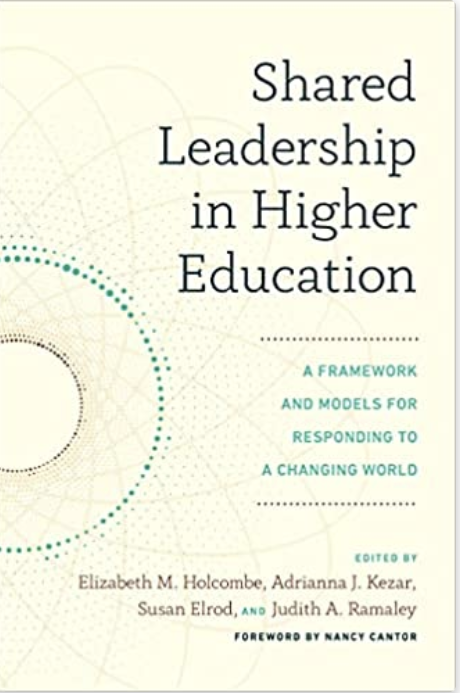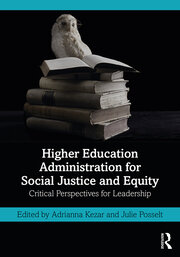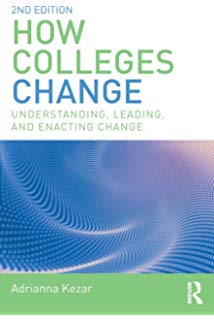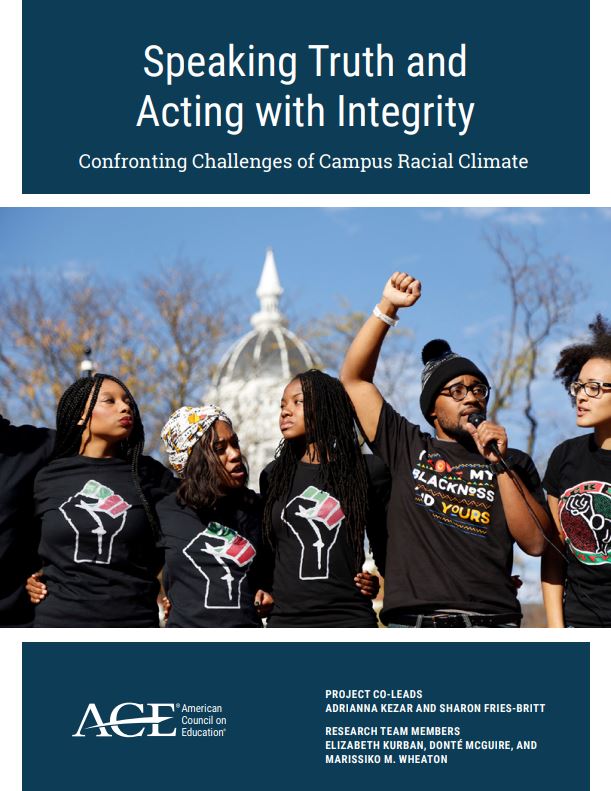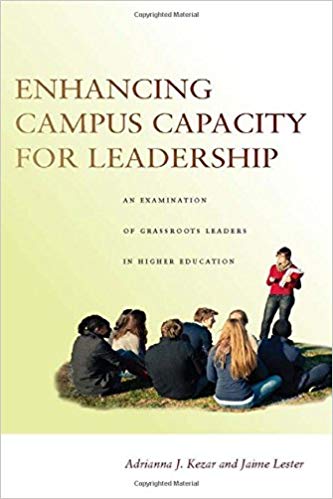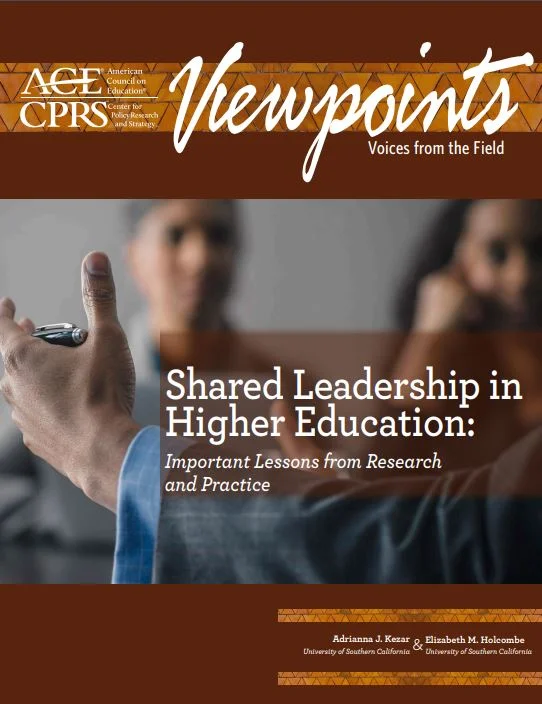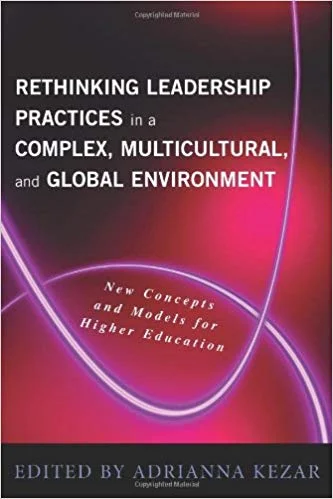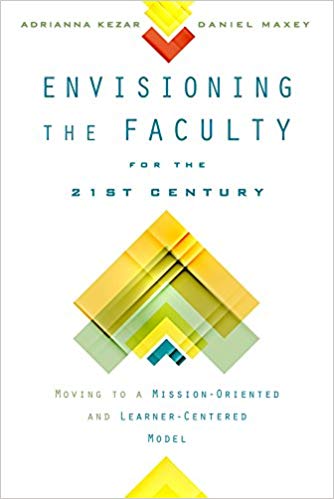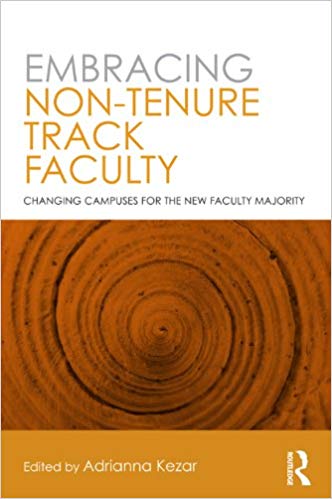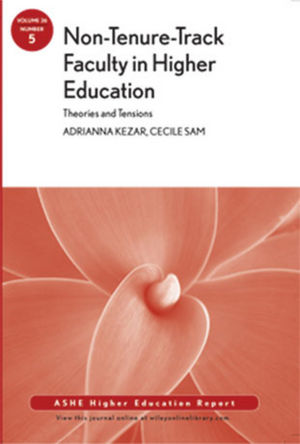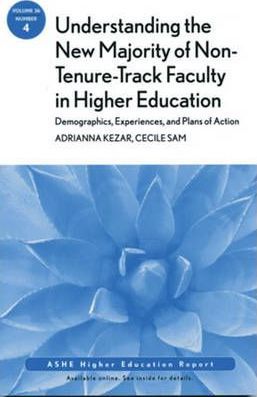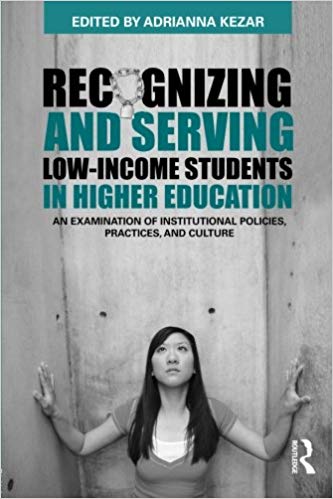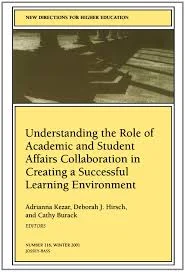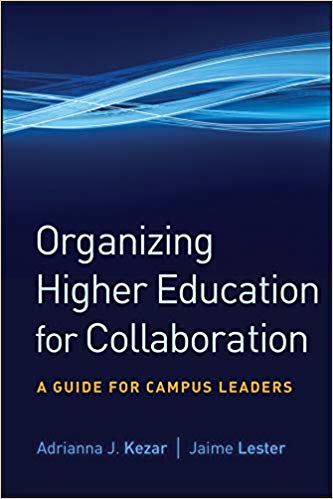Publications
Adrianna Kezar has six major areas of research: change; leadership; changing academic workforce—non-tenure track faculty; student success; diversity and equity; and governance.
Change/Change Leadership
Books
Carducci, R., Harper, J., Kezar, A. (2024). Higher education leadership: Challenging tradition and forging possibilities. Baltimore, MD: Johns Hopkins Press.
Hallett, R., Kezar, A., Kitchen, J & Perez, J. (2023). Creating a culture of ecological validation. Sterling, VA: Stylus Press.
Holcombe, E., Kezar, A., Elrod, S., & Ramaley, J. (2021). Shared leadership in higher education: Responding to a changing environment. Sterling, VA: Stylus Press.
Kezar, A., DePaola, & T., Scott, D. (2019). The Gig Academy. Johns Hopkins University Press.
Kezar, A. & Posselt, J. (2019). Higher Education Administration for Social Justice and Equity. Routledge.
Kezar, A. (2018). How colleges change: Understanding, learning, and enacting change (2nd ed.). New York, NY: Routledge.
Kezar, A., Drivalas, Y., & Kitchen, J. (2018). Envisioning Public Scholarship for Our Time: Models for Higher Education Researchers. Stylus Publishing.
Kezar, A. & Lester J. (2009). Organizing for collaboration in higher education” A guide for campus leaders. Jossey Bass Press.
Kezar, A., & Carducci, R., & Contreras-McGavin, M. (2006). Rethinking the “L” word in higher education: The revolution of research on leadership. Association for the Study in Higher Education Report, 31(6). San Francisco, CA: Jossey-Bass.
Kezar, A. (Ed.). (2005). Organizational learning in higher education. New Directions for Higher Education, 131.
Kezar, A., Chambers, T., & Burkhardt, J. (Eds.). (2005). Higher education for the public good: Emerging voices from a national movement. San Francisco: Jossey-Bass.
Eckel, P., & Kezar, A. (2003). Taking the reins: Institutional transformation in higher education. Westport, CT: Greenwood Publishing.
Kezar, A. (2001). Understanding and facilitating organizational change in the 21st Century: Recent research and conceptualizations. Washington, DC: ASHE-ERIC Higher Education Reports, 28(4).
Select Articles
Kezar, A. (2021). Understanding the relationship between organizational identity and capacities for scaled change within higher education intermediary organizations. Review of Higher Education, 45(1), 31-59 doi.org/10.1353/rhe.2021.0013
Kezar, A., &, Bernstein-Serra, S. (2020). Scaling culture change: A look at the AAU STEM initiative. Peabody Journal of Education, 95(4). 356-373. doi.org/10.1080/0161956X.2020.1800173
Gehrke, S., & Kezar, A. (2018). Perceived outcomes associated with engagement in and design of faculty communities of practice focused on STEM reform. Research in Higher Education, 1-26.
Kezar, A., Gehrke, S., & Bernstein-Sierra, S. (2018). Communities of transformation: Creating changes to deeply entrenched issues. The Journal of Higher Education. 73(4).
Kezar, A., & Gehrke, S. (2017). Sustaining communities of practice focused on STEM reform. The Journal of Higher Education, 88(3), 323-349.
Kezar, A., Gehrke, S., & Bernstein, S. (2017). Designing for success in STEM communities of practice: Philosophy and personal interactions. The Review of Higher Education, 40(2), 217-244.
Kezar, A. (2016). Consortial leadership toward large-scale change. Change: The Magazine of Higher Learning, 48(6), 50-57.
Elrod, S., & Kezar, A. (2016). Increasing student success in STEM: A guide to systemic institutional change. Washington, DC: Association for American Colleges and Universities.
Kezar, A. (2015). Scaling and sustaining change and innovation: Lessons learned from Teagle foundation’s faculty work and student learning initiative. New York, NY: Teagle Foundation.
Kezar, A., Gehrke, S., & Elrod, S. (2015). Implicit theories of change as a barrier to change on college campuses: An examination of stem reform. The Review of Higher Education, 38(4), 479-506.
Kezar, A. (2012). Understanding sensemaking/sensegiving in transformational change processes from the bottom up. Higher Education, 65(6), 761-780.
Kezar, A. (2011). What is the best way to achieve broader reach of improved practices in education? Innovative Higher Education, 36(4), 235-247.
Eckel, P., & Kezar, A. (2003). Key strategies for making new institutional sense: Ingredients to higher education transformation. Higher Education Policy, 16(1), 39-53.
Kezar, A., & Eckel, P. (2002). Examining the institutional transformation process: The importance of sensemaking, inter-related strategies and balance. Research in Higher Education, 43(3), 295-328.
Kezar, A., & Eckel, P. (2002). The effect of institutional culture on change strategies in higher education: Universal principles or culturally responsive concepts? The Journal of Higher Education, 73(4), 435-460.
Select Chapters
Kezar, A. (2016). Organizational theory and change. In J. Schuh, S. Jones, & V. Torres (Eds.), Student services: A handbook for the profession (6th ed.) (pp. 220-235). San Francisco, CA: Jossey-Bass.
Kezar, A. (2012). Organizational change in a global, postmodern world. In M. N. Bastedo (Ed.), The organization of higher education: Managing colleges for a new era (pp. 181-221). Baltimore, MD: Johns Hopkins University Press.
Leadership
Books/Monographs
Kezar, A., Fries-Britt, S., Kurban, E., McGuire, D., & Wheaton, M.M. (2018). Speaking truth and acting with integrity: Confronting challenges of campus racial climate. Washington, DC: American Council on Education.
Kezar, A., & Holcombe, E. (2017). Shared leadership in higher education: Important lessons from research and practice. Washington, DC: American Council on Education.
Kezar, A., & Lester, J. (2011). Enhancing campus capacity for leadership: An examination of grassroots leaders in higher education. Redwood City, CA: Stanford University Press.
Kezar, A. (Ed.). (2009). Rethinking leadership in a complex, multicultural and global environment. Sterling, VA: Stylus Publishing.
Select Articles
Ueda, N., Kezar, A., & Holcombe, E., (2025). Sharing emotional labor through shared equity leadership. Journal of diversity in higher education.
Harper, J, Kezar, A., Holcombe, E., Dizon, J, & Gonzlaez, A. (2025). Responding to restrictive legal environments through shared equity leadership. Journal of Higher Education.
Holcombe, E., Kezar, A., & A. Dizon, J. (2024). Models of shared equity leadership. Journal of Higher Education.
Holcombe, E., Kezar, A., & Ueda, N. (2023). Shared Equity Leadership: Working Collectively to Change Campus Cultures. Journal of Diversity in Higher Education.
Kezar, A., Holcombe, E., Harper, J & Ueda, N. (2023, Jan/Feb). Culture change requires personal and organizational changes: Lessons from the shared equity leadership model. Change, 55-1, 39-46.
Kezar, A. (2011). Faculty and staff grassroots leaders’ beliefs about power: Do their beliefs affect their strategies and effectiveness? International Journal of Leadership Studies, 6(1), 84-103.
Kezar, A., Gallant, T. B., Lester, J. (2011). Everyday people making a difference on college campuses: The tempered grassroots leadership strategies of faculty and staff. Studies in Higher Education, 36(2), 129-151.
Kezar, A., & Lester, J. (2010). Breaking the barriers of essentialism in leadership research: Positionality as a promising approach. Feminist Formations, 22(1), 163-185.
Kezar, A. (2010). Faculty and staff partnering with student activists: Unexplored terrains of interaction and development. Journal of College Student Development, 51(5), 451-480.
Reille, A., & Kezar, A. (2010). Balancing the pros and cons of community college “grow-your- own” leadership programs. Community College Review, 38(1), 59-81.
Kezar, A., & Lester, J. (2009). Supporting faculty grassroots leadership. Research in Higher Education, 50(7), 715-740.
Kezar, A., & Eckel, P. (2008). Advancing diversity agendas on campus: Examining transactional and transformational presidential leadership styles. International Journal of Leadership in Education, (11)4, 379-405.
Kezar, A. (2008). Understanding leadership strategies for addressing the politics of diversity. The Journal of Higher Education, 79(4), 406-441.
Kezar, A., Eckel, P., Contreras-McGavin, M., & Quaye, S. J. (2008). Creating a web of support: An important leadership strategy for advancing campus diversity. Higher Education, 55(1), 69-92.
Kezar, A., Lester, J., Glenn, W., & Nokamato, J. (2008). Examining organizational contextual features that affect implementation of equity initiatives. The Journal of Higher Education, 79(2), 125-159.
Kezar, A., & Lester, J. (2008). Leadership in a world of divided feminism. NASPA Journal About Women in Higher Education, 1(1), 51-75.
Kezar, A. (2007). Tools for a time and place: Phased leadership strategies to institutionalize a diversity agenda. The Review of Higher Education, 30(4), 413-439.
Kezar, A. (2007). Learning from and with students: College presidents creating organizational learning to advance diversity agendas. NASPA Journal, 44(3), 578-609.
Kezar, A., & Carducci, R. (2007). Cultivating revolutionary educational leaders: Translating emerging theories into action. Journal of Leadership Development, 2(1), 1-46.
Kezar, A. (2004). Philosophy, leadership, and scholarship: Confucian contributions to a leadership debate. Leadership Review, 4, 110-131.
Kezar, A. (2002). Reconstructing static images of leadership: An application of positionality theory. The Journal of Leadership Studies, 8(3), 94-109.
Kezar, A. (2001). Investigating organizational fit in a participatory leadership environment. Journal of Higher Education Policy and Management, 23(1), 85-101.
Kezar, A., & Moriarty, D. (2000). Expanding our understanding of student leadership development: A study exploring gender and ethnic identity. Journal of College Student Development, 41(1), 55-69.
Kezar, A. (2000). Pluralistic leadership: Incorporating diverse voices. The Journal of Higher Education, 71(6), 722-743.
Select Chapters
Kezar, A., Avilez, A., Drivlas, J., & Wheaton, M. (2017). Building social change oriented leadership capacity among student organizations: Developing students and campuses simultaneously. In D. M. Rosch (Ed.), The Role of Student Organizations in Developing Leadership, New Directions for Higher Education, 2017(155), 45-57.
Kezar, A. (2014). Women’s contributions to leadership and the road ahead. In K. A. Longman & S. R. Maden (Eds.), Women and leadership in higher education (pp. 117-134). Charlotte, NC: Information Age Publishing.
Kezar, A. (2012). Mutuality and reciprocity in urban renewal through shared leadership. In K. Gallagher, R. Goodyear, D. Brewer, & R. Rueda. (Eds.), Urban education: A model for leadership and policy (pp. 88-104). New York, NY: Routledge.
Changing academic staffing: VITAL/non-tenure track faculty
Books
Kezar, A., & Depaola, T., Scott, D. (2019). Academic labor in transition. Baltimore, MD: Johns Hopkins University Press.
Kezar, A., & Maxey, D., (Eds.). (2016). Envisioning the faculty for the 21st century: Moving to a mission-oriented and learner-centered faculty model. New Brunswick, NJ: Rutgers University Press.
Kezar, A. (Ed.). (2012). Embracing non-tenure track faculty: Changing campuses for the new faculty majority. New York, NY: Routledge.
Kezar, A., & Sam, C. (2011). Non-tenure track faculty in higher education: Theories and tensions. Association for the Study in Higher Education Report, 36(5). San Francisco, CA: Jossey-Bass.
Kezar, A., & Sam, C. (2010). Understanding the new majority of non-tenure-track faculty in higher education: Demographics, experiences, and plans of action. Association for the Study in Higher Education Report, 36(4). San Francisco, CA: Jossey-Bass.
Select Articles
Culver, KC, Kezar, A. & Koren, E. (2025). A new conceptual framework for faculty in the 21st century. Journal of Higher Education.
Culver, KC. & Kezar, A. & Koren, E. (2023). Improving access and inclusion for VITAL faculty in the scholarship of teaching and learning through sustained professional development. Innovative Higher Education. 1-24.
Kezar, A & Harper, J. (2023). Improving the work lives of non-tenure track faculty: Lessons from winners of the Delphi award. Academe, 4, 16-24.
Culver, KC., Harper, J., & Kezar, A. (2022). Engaging design thinking in professional bureaucracies: Improving equity for non-tenure track faculty in higher education. Higher Education Policy and Leadership Studies, 3(1), 68-89.
Kezar, A., & DePaola, T. (2018). The changing face of employment at research universities. New Directions for Institutional Research, 2017(176), 83-96. https://doi.org/10.1002/ir.20246
Kezar, A., & Sam, C. (Eds.). (2011). Understanding non-tenure track faculty: New assumptions and theories for conceptualizing behavior [Special issue]. American Behavioral Scientist, 55(11).
Holcombe, E., & Kezar, A. (2017). Mental model and implementing new faculty roles. Innovative Higher Education, 43(2), 91-106.
Kezar, A., Maxey, D., & Holcombe, E. (2016). The professoriate reconsidered: A study of new faculty models. Thought & Action, 32(1), 65-88.
Kezar, A., & Maxey, D. (2014). Faculty matter: So why doesn’t everyone think so? Thought & Action, 30, 29-44.
Kezar, A., & Sam, C. (2014). Governance as a catalyst for policy change: Creating a contingent faculty friendly academy. Educational Policy, 28, 425-462.
Kezar, A. (2013). Examining non-tenure track faculty perceptions of how departmental policies and practices shape their performance and ability to create student learning at four-year institutions. Research in Higher Education, 54(5), 571-598.
Kezar, A. (2013). Departmental cultures and non-tenure-track faculty: Willingness, capacity, and opportunity to perform at four-year institutions. The Journal of Higher Education, 84(2), 153-158.
Kezar, A., & Sam, C. (2013). Institutionalizing equitable policies and practices for contingent faculty. The Journal of Higher Education, 84(1), 56-87.
Kezar, A., & Sam, C. (2011). Understanding non-tenure track faculty: New assumptions and theories for conceptualizing behavior. American Behavioral Scientist, 55(11), 1419-1442.
Select Chapters
Kezar, A., & DePaola, T. (2018). Neoliberalism and faculty roles: The politics of academic work. In B. Cantwell, H. Coates, & R. King (Eds.), Handbook on the politics of higher education (pp. 449–467). Cheltenham, UK: Edward Elgar Publishing.
Kezar, A., & Bernstein-Sierra, S. (2016). Contingent faculty as nonideal workers. In L. Wolf-Wendel (Ed.), How ideal worker norms shape work-life for different constituent groups in higher education, New Directions for Higher Education, 2016(176), 25-35.
Gehrke, S., & Kezar, A. (2015). Unbundling the faculty role in higher education: Utilizing historical, theoretical and empirical frameworks to inform future research. In M. B. Paulsen (Ed.), Higher Education: Handbook of Theory and Research, 30 (pp. 99-150). New York, NY: Springer.
Sam, C., & Kezar, A. (2014). Contingent appointments and the diminishing voice, agency, and professionalism of women. In A. Stepnick & K. DeWelde (Eds.), Disrupting the culture of silence: Confronting gender inequality and making change in higher education (pp. 67-82). Sterling, VA: Stylus Publishing.
Kezar, A., & Maxey, D. (2012). Missing from the institutional data picture: Non-tenure-track faculty. In J. X. Yonghong (Ed.), Refining the focus on faculty diversity in postsecondary institutions, New Directions for Institutional Research, 2012(155), 47-65.
Kezar, A., & Sam, C. (2010). Beyond contracts: Non-tenure track faculty and campus governance. The NEA 2010 almanac of higher education (pp. 83-91). Washington, DC: National Education Association.
Reports
Kezar, A., Maxey, D., & Holcombe, E. (2015). The professoriate reconsidered: A study of new faculty models. New York, NY: TIAA-CREF Research Institute.
Kezar, A., & Maxey, D. (2015). Adapting by design: Creating faculty roles and defining faculty work to ensure an intentional future for colleges and universities. Los Angeles, CA: Pullias Center for Higher Education & Association for American Colleges and Universities.
Kezar, A., & Maxey, D. (2014). Student outcomes assessment among the new non-tenure track faculty majority. Indianapolis, IN: National Institute for Learning Outcomes Assessment.
Kezar, A., Gehrke, S., & Maxey, D. (2014). Unbundling versus designing faculty role. Washington, DC: American Council on Education.
Kezar, A. (2014). Changing faculty workforce models. New York, NY: TIAA-CREF Research Institute.
Kezar, A., Eaton, J., & Maxey, D. (2013). An examination of the changing faculty: Ensuring institutional quality and achieving desired student learning outcomes. Washington, DC: Council for Higher Education Accreditation.
Student Success
Books
Hallett, R.E., Kezar, A., Kitchen, J.A., & Perez, R.J. (2023). Creating a Campus-Wide Culture of Student Success: An Evidence-Based Approach to Supporting Low-Income, Racially Minoritized, and First-Generation College Students (1st ed.). Routledge. https://doi.org/10.4324/9781003443711
Kezar, A. (Ed.). (2010). Recognizing and serving low-income students in higher education: An examination of institutional policies, practices, and culture. New York, NY: Routledge.
Kezar, A., & Lester, J. (2009). Organizing higher education for collaboration: A guide for campus leaders. San Francisco, CA: Jossey-Bass.
Kezar, A., Hirsch, D., & Burack, K. (Eds.). (2001). Understanding the role of academic and student affairs collaboration in creating a successful learning environment. New Directions for Higher Education, 116.
Toma, J. D., & Kezar, A. (Eds.). (1999). The collegiate ideal: The current state and future prospects of the idea of campus. New Directions for Higher Education, 105.
Select Articles
Hallett, R., & Kezar, A., Corwin, Z., & Toccoli, J., (2025). Understanding the role of faculty coordinators in a comprehensive college transition program. Journal of the First Year Experience.
Kezar, A., Hallett, R., Corwin, Z, Hypolite, L., & Nagbe, M. (2025). Professional learning communities and culture change in higher education: Facilitators to learning ecological validation to support historically marginalized students. Journal of postsecondary student success.
Perez, R. & Kezar, A., (2025). Ecological Validation: A Complementary Approach to DEI Work and Lever for Supporting Minoritized Student Success. Journal of Postsecondary Student Success.
Kezar, A., Hallett, R., Corwin, Z. & Hypolite, L. (2024). Professional learning communities advancing culture change. Innovative higher education.
Hallett, R., Kezar, A., Kitchen, J., & Perez, R. (2024). Creating a Campus-wide Culture of Support for Historically and Currently Marginalized Students. Change: The Magazine of Higher Learning.
Kezar, A., Kitchen, J. A., Estes, H., Hallett, R., & Perez, R. (2023). Tailoring programs to best support low-income, first-generation, and racially minoritized college student success. Journal of College Student Retention: Research, Theory & Practice, 25(1), 126-152.
Kezar, A., Perez, R., & Swanson, E. (2022). The potential of and mechanisms for a hub of innovation on campus to support changes for low-income, first generation and racialized minority college students. Research in Higher Education, 1(24).doi.org/10.1037/dhe0000401
Kezar, A., Hallett, R. E., Perez, R. J., & Kitchen, J. A. (2022). Scaling success for low-income, first-generation in college, and/or racially minoritized students through a culture of ecological validation. Journal of Diversity in Higher Education. Advance online publication. https://doi.org/10.1037/dhe0000401
Kezar, A., Hypolite, L., & Kitchen, J. A. (2020). Career self-efficacy: A mixed-methods study of an underexplored research area for first-generation, low-income, and underrepresented college students in a comprehensive college transition program. American Behavioral Scientist, 64(3), 298–324. doi.org/10.1177/0002764219869409
Kezar, A. J., & Holcombe, E. (2018). Challenges of implementing integrated programs for underrepresented students in STEM: A study of the CSU STEM collaboratives. Educational Policy.
Kezar, A. (2010). Organizational culture and its impact on partnering between community agencies and postsecondary institutions to help low-income students attend college. Education and Urban Society, 43(2), 205-243.
Kezar, A. (2007). A tale of two cultures: Schools and universities in partnership for school reform and student success. Metropolitan University Journal, 18(4), 28-47.
Kezar, A. (2006). Redesigning for collaboration in learning initiatives: An examination of four highly collaborative campuses. The Journal of Higher Education, 77(5), 804-838.
Kezar, A. (2006). Examining the ways institutions create student engagement: The role of mission. Journal of College Student Development, 47(2), 149-172.
Kezar, A. J. (2006). The impact of institutional size on student engagement. NASPA Journal, 43(1), 87-114.
Kezar, A. (2005). Redesigning for collaboration within higher education institutions: An exploration into the developmental process. Research in Higher Education, 46(7), 831-860.
Kezar, A. (2003). Achieving student success: Strategies for creating partnerships between academic and student affairs. NASPA Journal, 41(1), 1-22.
Kezar, A. (2003). Enhancing innovative partnerships: Creating a change model for academic and student affairs collaboration. Innovative Higher Education, 28(2), 137-156.
Kezar, A. (2001). Theory of multiple intelligences: Implications for higher education. Innovative Higher Education, 26(2), 141-154.
Select Chapter
Kezar, A., & Gerhke, S. (2014). Supporting and enhancing student learning through partnerships with academic colleagues. In J. Stringer & G. McCellan (Eds.), The handbook of student affairs administration (4th ed.) (pp. 405-422). San Francisco, CA: Jossey-Bass.
Diversity and Equity
Book
Kezar, A. (Ed.). (2010). Recognizing and serving low-income students in higher education: An examination of institutional policies, practices, and culture. New York, NY: Routledge.
Select Articles
Kezar, A., & Wheaton, M. (2017). The value of connective leadership: Benefiting from women's approach to leadership while contending with traditional views. About Campus, 21(6), 19-26.
Shahjahan, R. A., & Kezar, A. J. (2013). Beyond the “National Container”: Addressing methodological nationalism in higher education research. Educational Researcher, 42(1), 20-29.
Kezar, A., & Lester, J. (2010). Breaking the barriers of essentialism in leadership research: Positionality as a promising approach. Feminist Formations, 22(1), 163-185.
Kezar, A., Lester, J., & Yang, H. (2009). Nonprofits partnering with postsecondary institutions to increase low-income student access. Educational Policy, 24(3), 500-533.
Kezar, A., & Eckel, P. (2008). Advancing diversity agendas on campus: Examining transactional and transformational presidential leadership styles. International Journal of Leadership in Education, (11)4, 379-405.
Kezar, A. (2008). Understanding leadership strategies for addressing the politics of diversity. The Journal of Higher Education, 79(4), 406-441.
Kezar, A., Eckel, P., Contreras-McGavin, M., & Quaye, S. J. (2008). Creating a web of support: An important leadership strategy for advancing campus diversity. Higher Education, 55(1), 69-92.
Kezar, A., Lester, J., Glenn, W., & Nokamato, J. (2008). Examining organizational contextual features that affect implementation of equity initiatives. The Journal of Higher Education, 79(2), 125-159.
Kezar, A., & Lester, J. (2008). Leadership in a world of divided feminism. NASPA Journal About Women in Higher Education, 1(1), 51-75.
Kezar, A. (2007). Tools for a time and place: Phased leadership strategies to institutionalize a diversity agenda. The Review of Higher Education, 30(4), 413-439.
Kezar, A. (2007). Learning from and with students: College presidents creating organizational learning to advance diversity agendas. NASPA Journal, 44(3), 578-609.
Kezar, A. & Eckel, P. (2007). Learning to ensure the success for students of color: A systemic approach to effecting change. Change: The Magazine of Higher Education, 39(4), 18-21.
Select Chapter
Kezar, A., Walpole, M., & Perna, L. (2014). Engaging low-income students. In S. J. Quaye & S. R. Harper (Eds.), Student engagement in higher education: Theoretical perspectives and practical approaches for diverse populations (2nd ed.) (pp. 237-257). New York, NY: Routledge.
Governance
Select Articles
Kezar, A. (2006). Rethinking public higher education governing boards performance: Results of a national study of governing boards in the United States. The Journal of Higher Education, 77(6), 968-1008.
Kezar, A., Lester, J., & Anderson, G. (2006). Challenging stereotypes that interfere with effective governance. Thought & Action, 22, 121-132.
Kezar, A. (2005). Consequences of radical change in governance: A grounded theory approach. The Journal of Higher Education, 76(6), 634-668.
Kezar, A., & Eckel, P. (2004). Meeting today’s governance challenges: A synthesis of the literature and examination of a future agenda for scholarship. The Journal of Higher Education, 75(4), 371-400.
Select Chapters
Eckel, P., & Kezar, A. (2016). The intersecting authority of boards, presidents, and faculty: Toward shared leadership. In P. Altbach, M. N. Bastedo, & P. Gumport (Eds.), American higher education in the twenty-first century (4th ed.) (pp. 155-190). Baltimore, MD: Johns Hopkins University Press.
Kezar, A., & Gerhke, S. (2014). Grassroots leadership: Responding to declining shared governance in the neoliberal world. In L. Qi & C. Gerstl-Pepin (Eds), Survival of the fittest: The shifting contours of higher education in China and the United States (pp. 101-120). Heidelberg, DE: Springer-Verlag.
Holcombe, E., Kezar, A., Elrod, S., & Ramaley, J. (2021). Shared leadership in higher education: Responding to a changing environment. Sterling, VA: Stylus Press.


